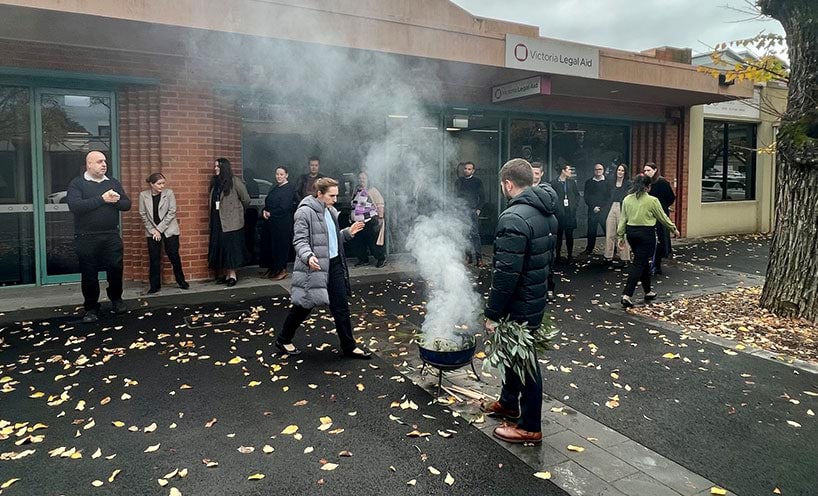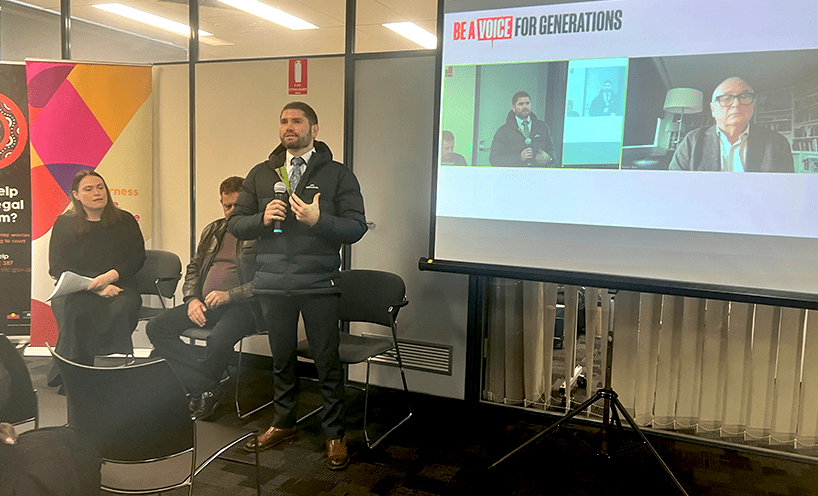- Published:
- Wednesday 31 May 2023 at 9:03 am
On Tuesday 30 May we came together on Dja Dja Wurrung Country at our Bendigo office and online, to mark National Reconciliation Week – a time to reflect on our shared journey towards reconciliation and explore how we can each contribute and make a difference.
National Reconciliation Week is an opportunity for us all to learn about First Nations peoples’ cultures and histories, and share stories about their leadership, strength and resilience.
Welcome to Country
The event began with a Welcome to Country and traditional smoking ceremony, by Yorta Yorta and Dja Dja Wurrung man and Dja Dja Wurrung Traditional Owner Troy Firebrace.
Troy spoke about the value of culture and the impact of having it taken away.
‘When we take away people, language, traditions, it can have a devastating effect on culture. Losing our culture, losing our kids, losing our sense of space and place, losing our ability to go to those places, and losing our ability to pass on morals and values.
‘If we want to learn about longevity for organisations and for ourselves, look at a culture with 60,000 years of prosperity … we need to learn from Aboriginal culture and how to embed it.
‘As Aboriginal people, we bring openness and expect that it is received. It is time for us to come together and learn about each other.’
Being active champions for reconciliation
While our planned keynote speaker Travis Lovett, Kerrupmara Gunditjmara Traditional Owner and Commissioner at the Yoorrook Justice Commission was sadly unable to attend, his fellow Yoorrook Commissioner, Professor the Honourable Kevin Bell AM KC, was able to speak to us instead.
Professor Bell spoke openly about his role as the only non-Aboriginal Yoorrook Justice Commissioner and his contribution to reconciliation.
‘I am working with four distinguished First People, in a commission for self-determinism for First People. My role is to support my fellow commissioners and other Aboriginal people in working toward and realising self-determinism as they choose it to be.
‘We are walking on the country of First People with permission of First People, speaking about Aboriginal business with permission of First People … with that is a moral covenant to come with purpose, to be supportive by drawing on my expertise [as a former supreme court judge] in helping them achieve self-determinism as they conceive it to be.’
Professor Bell highlighted key aspects that he sees in how non-Aboriginal people can be active champions of reconciliation, starting with a responsibility to understand, appreciate and value the culture of First Peoples.
‘I've been enriched by the way First Nations people have shared their culture with me. It’s our personal responsibility to … appreciate the significance of what is being shared with us, by those who are prepared to communicate and explain their culture to us.’
He also reflected on the significance of truth-telling in Australia's reconciliation journey, particularly in recognising systemic racism as a feature of both society and the law.
‘Reconciliation involves respectful understanding and walking together from here on. To be informed by the wrongs of history that continue, and that have been done as a result of colonisation.
‘Justice is fundamental to reconciliation. Truth is fundamental to justice. Reconciliation without these is not really achievable.’
Our work toward reconciliation
We have a continued commitment to reconciliation and supporting First Nations people in self-determination. We prioritise improving outcomes for First Nations people in the legal system by supporting First Nations-led solutions.
Executive Director Regions and Service Delivery Peter Noble highlighted some of the work we are currently doing toward reconciliation, including:
- developing our third Reconciliation Action Plan, which is due to be launched later this year
- expanding the Aboriginal community engagement officer program
- delivering cultural training for our staff and practice partners, including private practitioners.
Director First Nations Services Lawrence Moser, a proud Taungurung man said that he is proud to work at VLA as a First Nations staff member.
‘VLA is on a journey. We have a long way to go, but we’re on a good journey.
‘The next RAP [Reconciliation Action Plan] is a really solid plan to progress the work in regards to where we are moving forward.’
More information
Read more from our CEO, Louise Glanville, on the actions the legal sector can take to contribute towards reconciliation.
Updated



